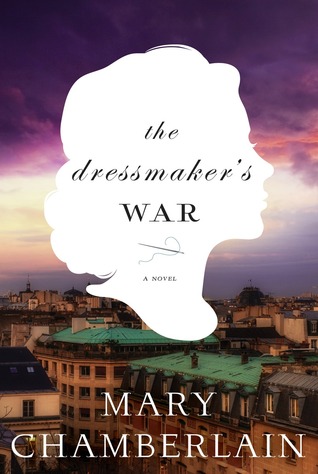On the eve of World War II, Ada Vaughn is a mannequin for a dressmaker in London. She has a fair bit of dressmaking skill herself, and hopes to one day open her own fashion house: House of Vaughn, something that she holds in her mind as parallel to Chanel. She dreams of living a higher-style of life in general, to the point of taking elocution lessons in an attempt to "better" herself from her common origins, living in a small flat with her parents and many siblings. And when a young man approaches her on the street one day, claiming to be an Austrian count, Ada is completely swept away. It's a whirlwind romance, but it ends badly, with Ada stranded in Europe after the war begins, with no money and no way to get home. The series of events that follows leads us in a full circle, back to the prologue and Ada's preparation for her own execution, and serves to read "between the lines" of a story of a young woman swept up in the tide of war.
If I could compare this book to only one other, I would compare it to Hannah Kent's Burial Rites. The time, location, and characters have absolutely no crossover; they take place more than a century apart, in different countries and to very different people. But from the very beginning we know--or can at least infer with very little difficulty--that both the main characters, Kent's Agnes and Chamberlain's Ada, are sentenced to die.
We don't know why Ada is sentenced to death. We have to actually read the story for that. But the feels of the two books, of the story going back in time to trace the path to the heroine's death sentence, is very similar. The structures aren't; other than the prologue, Chamberlain's story is told in a very straightforward manner whereas Kent has a few more narrative devices employed. But there's just this feel to The Dressmaker's War, one that really matched Burial Rites even when there was very little in content to connect the two of them.
Stories of women in WWII are, I think, very few and far between. There aren't a lot of prominent female historical figures, so finding a good character to write in a historical fiction context can be difficult. Chamberlain completely invented Ada, but uses her as a lens to view a few other historically-based people that come and go, and to show the overall plight of a woman, and a civilian, stuck in the war. AS a female civilian, Ada isn't a prisoner of war. She's just a prisoner. There's no sort of prisoner exchange for her. No one knows where she is or if she's even alive. She's gone through a lot of trauma, and even when she returns home, no one wants to help or support her. Everyone wants to leave the war completely behind them, even though its consequences haunt every moment of Ada's life. It's a tragic story, really, and as Chamberlain says in the afterword, Ada didn't stand a chance. It's the story of untold stories here that's really intriguing, and how those stories were untold not only because people didn't want to talk about them, but because even the people who did want to talk were cognizant of the fact that no one wanted to listen.
That said...I didn't really like Ada as a person or a character. The only portion of the book I really liked her for was the Dachau portion. I felt like, under the strain of her situation, she became a much more real and likable person. For the rest of the book, I found her stuck-up, bratty, and pretty stupid at the same time. She made all sorts of crazy decisions that, even in a narrative context, just had me rolling my eyes and wanting to shake her, and she made those decisions for reasons that came off as flimsy more than anything. I though the Dachau portion would really be a turning point for Ada, and that she'd be more sympathetic from then on--but as soon as she left and returned to London, I found that all of her brattiness and poor decision making came roaring back.
Chamberlain does a great job of capturing atmosphere here, and it's interesting to see how clueless Ada was due to her isolation in Germany, but because I didn't really like Ada as a character, this book didn't have the emotional impact it should have. I liked many of the supporting characters much more than Ada herself, and at the end, quite frankly I wasn't very sad to see her go.
3 stars out of 5.

No comments:
Post a Comment